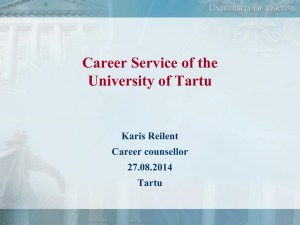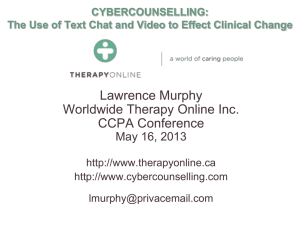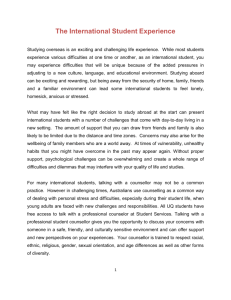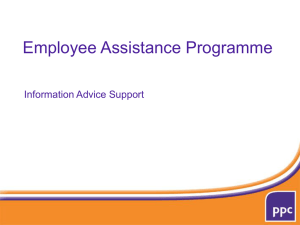Cultural Dynamics in Counselling Refugees
advertisement
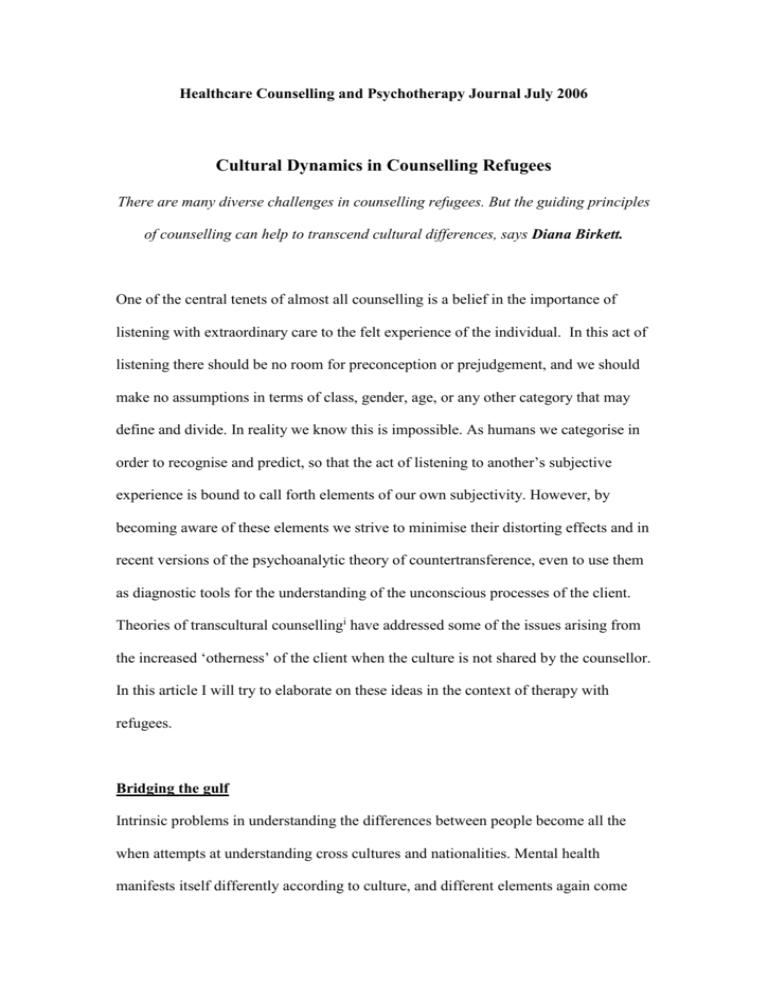
Healthcare Counselling and Psychotherapy Journal July 2006 Cultural Dynamics in Counselling Refugees There are many diverse challenges in counselling refugees. But the guiding principles of counselling can help to transcend cultural differences, says Diana Birkett. One of the central tenets of almost all counselling is a belief in the importance of listening with extraordinary care to the felt experience of the individual. In this act of listening there should be no room for preconception or prejudgement, and we should make no assumptions in terms of class, gender, age, or any other category that may define and divide. In reality we know this is impossible. As humans we categorise in order to recognise and predict, so that the act of listening to another’s subjective experience is bound to call forth elements of our own subjectivity. However, by becoming aware of these elements we strive to minimise their distorting effects and in recent versions of the psychoanalytic theory of countertransference, even to use them as diagnostic tools for the understanding of the unconscious processes of the client. Theories of transcultural counsellingi have addressed some of the issues arising from the increased ‘otherness’ of the client when the culture is not shared by the counsellor. In this article I will try to elaborate on these ideas in the context of therapy with refugees. Bridging the gulf Intrinsic problems in understanding the differences between people become all the when attempts at understanding cross cultures and nationalities. Mental health manifests itself differently according to culture, and different elements again come into play with the experience of migration. How are we, as counsellors educated in the Western tradition, to evaluate these elements and their interaction - especially when they involve not just cultural differences between races and nationalities, but degrees of suffering and collective oppression that we will probably never experience? The concept of ‘cultural sensitivity’ (which at its most basic has been defined as ‘the counsellor’s sensitivity to cultural variations and the cultural bias of their own approach’ii) seems inadequate in addressing this combination. Even leaving aside the unimaginable nature of torture and its effects on the mind, anyone working with refugees is faced with stories of multiple losses: extreme social dislocation, enforced exile and cumulative trauma on arrival in the host country. Because many of the problems faced by refugees are immediate and practical, counsellors are often called on to intervene in a pragmatic way, for example by writing letters, acting as advocates, and cross-referring either within or outside their employing organisation. The Medical Foundation for the Care of the Victims of Torture, has been in existence for 20 years and has centres in London, Newcastle and Manchester and Glasgow. In 2005 the organisation death with over 2700 new referrals from a huge variety of sources including GPs, solicitors, social services, specialist refugee organisations, hospitals and community mental health teams. The Medical Foundation offers a variety of services, including legal and medical support, psychotherapy, creative therapies, casework, family therapy, group-work and even gardening projects. In theory it might appear that the specificity of the counselling project could be preserved here by referring more practical issues to other specialists, while not having to send the client to an outside agency. Nevertheless, we still encounter one of the major cultural issues to confront the counsellor. More than with most client groups, we have to consider very carefully the impact of exposing clients to a variety of clinicians and approaches. Often the trust between counsellor and client has been hard-won, carefully developed over time, and any trace of ‘offloading’ our client will endanger this – even in situations in which a sense of hopelessness in the counsellor may truly be the reason for cross-referring. Moreover, people from more deferential cultures, in which there is an expectation of material help from those in authority, often find it difficult to accept the counsellor’s emphasis on self-help, on the separation of functions, and on the avoidance of practical or directive interventions. It is a truism of transcultural counselling theory that attitudes to authority vary widely between cultures, and that Western ideals of personal self-sufficiency and individualism conflict with other cultures’ expectations of practical support, advice and mutuality. ‘Referring out’ may well be experienced as a lack of care or rejection. At the other end of the spectrum, the refusal to accept a gift from a client (for instance, on a client’s return from a visit to their own country) may well be experienced as a denial of the capacity for gratitude and mutuality. On such occasions the counsellor may feel their training has been unduly rigid, and will need once more to ponder the meaning of such individual actions in light of the client’s social context, as well as the context of the agency. We may take refuge in the thought that a central principle of many counselling schools (and one that is increasingly borne out by outcome research) is that the most effective tool of therapeutic change is the relationship itself. This principle lends itself well to counselling work with refugees. But we have to find a way of adapting this relationship to make it more capacious, more able to include elements of the real world. Our tradition, based on tendencies towards dualism in the philosophies of the West, is to draw a distinction between inner and outer worlds. This comes under serious challenge, not only from the generally more holistic philosophies of other cultures, but also in view of the impact of cataclysmic change on the lives of refugees, which make such distinctions unreal. The relationship between a counsellor and their refugee client has to accommodate this blurring of distinctions, and move flexibly between the immediate demands of the refugee’s life and their need to make sense of their experience. There will always be dangers of creating dependency by ‘doing things for clients’. Equally though, there will be gains in terms of the symbolic value of such interventions. My own rule of thumb when faced with the dilemma of when to act rather than talk is to ask two questions: ‘Is there anyone else who can do this’, and how will it affect the relationship if I refuse (or accept)?’ This keeps the focus in my own mind on the meaning of the action as much as on its immediate effect, and the need to represent ‘the good object’ when so many good objects, both internal and external, have been destroyed. It is not always easy to keep this focus, and there can be the temptation to ‘do’ because anything else seems impossible when confronted with the magnitude and multiplicity of the refugee’s problems. Similarly, the desire to be good and helpful to counteract the effects of others’ cruelty (whether at the hands of the torturer or of the Home Office) can lead to a self-idealisation which may play into a traumatised client’s need to split into clearly good and clearly bad. In my early experience of providing therapy for refugees, I used to try to address this split by questioning my clients’ respectful or apparently idealising attitude towards me and the organisation, and was often upbraided for this: ‘Why do you question the truth of what I say? Why do you always see yourself as the target of my anger?’ I believe that a certain amount of idealisation may be necessary in order to create safe places in the mind, and also because cultures that privilege respect and deference do not necessarily wish for ambivalence and aggression to be expressed directly. A little knowledge… So how are we to understand the world the refugee has lost, but still carries around internally? All of us have a network of cultural referents of which we are only partially aware, influenced perhaps by our reading, our holidays, and idealising or denigrating fantasies about other worlds. It is often suggested that, when working transculturally we take some time to inform ourselves about our client’s country of origin: its history, politics, social systems, and its relationship to colonial power. This can be a useful way of getting some purchase on the client’s experience, but can also lead to a kind of ‘Michelin Guide’ illusion of knowing a country, and therefore the whole cultural background of the client. Thus Edward Said in 1991 wrote of Orientalism (a term denoting the West’s cultural ‘take’ on the East): ‘Something patently distant acquires…a status more rather than less familiar. One tends to stop judging things as either completely novel or completely well known. A new median category emerges, a category that allows one to see new things, things seen for the first time, as versions of a previously known thing. In essence such a category is not a way of receiving new information, as it is a way of controlling what seems to be a threat to some established view of things.’iii So we need to be aware. If we emerge from this ‘mugging up’ with any sense of certainty and control, we should suspect its usefulness. It can only be a starting-point for questions, some of which may be asked directly of the client, others of which may remain in the mind of the counsellor as areas of uncertainty and possible difference. Some such areas are better documented than others. Those that recur most frequently in the literature concern relations between the sexes, between the individual and the family, between the group and the state, and attitudes to religion. We are often told that other cultures value the group (the extended family or the social system) more than the individual, and that our emphasis on individuation is not relevant to nonwestern societies. Similarly, our secular society has difficulty in understanding the reverence in which religious laws are held by some of our clients: the furore last February over the publication in a Danish newspaper of cartoons depicting the prophet Muhammad illustrates such fundamental differences of ideology. But how are we to differentiate between an attitude that would be considered normal within a particular group, and one that would denote individual disturbance? On one recent occasion, I had held back from questioning a Muslim client’s submissive attitude towards his mother because he stated that ‘in my culture we don’t show disrespect to our parents’. Although I had sensed a feeling of suppressed rage and emasculation in this client, I then felt I could not explore it. Our interpreter, who was also a Muslim though from a different ethnic group, later echoed my feeling that this was probably an instance of family dysfunction, rather than customary respect. But was she any more qualified to back this opinion than I was? ‘In my culture we…’ can sometimes be a defence against uncomfortable exploration, and against the loss of familiar assumptions in the midst of the massive unfamiliarity of the host country. In counselling those from other cultures we rely on subtle clues to read our clients’ communications, and we have to tread carefully in the absence of such clues. As Dick Blackwell argues in his recent book, ‘Counselling and psychotherapy with refugees’iv: ‘Cultures are never static: they contain many cultures within themselves, often in a state of conflict, especially between genders and generations.’ Thus some refugees, especially women who have been sexually abused, may have ended up in this country as a result of conflict with their own. In such cases, attitudes to rape and genital mutilation (for example) may arouse particularly strong feelings in the counsellor, and will be likely to give rise to unconsidered reactions, either of inappropriate cultural relativism or outright condemnation. Similarly, it may not be easy for a counsellor who is something of a feminist to empathise with a male client who is distraught because his young daughter is slipping out of his control, because she has been ‘contaminated’ by Western values. We need to remain continually mindful that the refugee is ‘fixed in transition’ between the culture he has left and the one he has ended up in, without truly belonging to either. Perceptions of the counsellor In the same way as we strive to be aware of our own preconceptions about our clients and their culture, with varying degrees of success, we must also be aware of theirs about us. A client’s perception may be affected by a variety of factors: experience or knowledge of the host country as a colonial power; assumptions about a counsellor’s political attitudes or degree of wealth; presumptions about their racism, or its absence. At the Medical Foundation, if a clinician is Jewish or white South African, for instance, it can give rise to certain assumptions on the part of clients that need to be addressed. It is tempting in these situations to over-identify with the client in a defensive way, or to idealise their perceptions as the ‘underdog’, or innocent victim, because of guilt over the West’s colonial and racist past. A consequence may be to deny the distorting influence of war and other traumas on the psyche of the individual. Alternatively, we may lose sight of the unique personhood of each client, assuming an ideal pre-trauma personality whose present state is due solely to subsequent traumatic experiences. In contrast, it is often also true that a counsellor will represent the one benign experience a client has of their new host country. Days spent dealing with benefit officials, housing departments, and Home Office restrictions, not to mention the everyday demonisation of refugees by the tabloids, and the casual racism of individuals, may leave a refugee client feeling desperate for a benevolent representative of the country in which they find themselves. We have to take this function seriously, while avoiding the pitfalls of self-idealisation and the projection of our own anger onto colleagues and other organisations. Reliability and kindness (a word not often used in the field of counselling) are crucial, both from counsellors and other professionals and support workers. As one Iraqi client put it, ‘Coming to the Medical Foundation is like coming to mosque’ --- a place of refuge and spiritual solace. It is easy to see how such a place of refuge fulfils a crucial function in a client’s experience of exile, especially in this case in view of the role of the UK in the Iraqi conflict. Human universals Cultural differences and their impact on the counselling process must not be underestimated. Much of the literature on the subject assumes that such differences can be overcome by taking thought and developing ‘cultural sensitivity’. On the contrary, we need to acknowledge that some differences in culture and perception are in fact insuperable. If, as Blackwell asserts, ‘a culture is the symbolic universe of its members’, we can never hope to understand fully cultural complexities, and must tolerate a degree of unknowing, without ceasing to think about what it is we are trying to do. In this respect it is unfortunate that the neglect of supervision is frequent in this fieldv, on the ground that few are qualified to offer it. Training is likewise often nonexistent or superficial: Sue et alvi suggest, in an exploration of multicultural counselling, that inadequate training is the major reason for therapeutic ineffectiveness. And ‘a place to think’ is all the more important when new parameters are being explored. ‘Clinical supervision is essential in allowing practitioners to explore cross-cultural themes further. Respectful, supportive supervision should facilitate the constructive questioning of a practitioner’s attitude and expectancies of cross-cultural work’i Despite the enormous number of cultural variables, there are certain human universals. One of those quoted most consistently of late is the absolute wrongness of torture - wrong in itself even when designed to extract life-saving information. Another is the need of human beings for each other, however their society is organised. One of the rewards of encountering the experience of men and women whose lives have been so different from ours, on the intimate level that is the cultural relationship, is to find the humanity that links us, however disguised by differences of language and upbringing. Another is to reflect on the assumptions of similarity we bring to therapy with people from our own culture. There is much that we miss because of these assumptions, and because we do not ask the right questions. It is cheering for the therapist to realise that some of the guiding principles of counselling transcend cultural difference. Listening to the unique experience of individuals, not making assumptions, and safeguarding the relationship, are as central as ever. Diana Birkett is a psychoanalytic therapist working at the Medical Foundation. She is also Head of Counselling at Sutton Counselling. Her private practice includes work with alcohol problems and eating disorders. References i ii Palmer,S. and Laungani. London: Sage:1999 D’Ardenne, P. and Mahtani, A. Transcultural Counselling in Action. London: Sage:1999 iii Said, Edward W. Orientalism. London: Penguin Books: 1991. Blackwell, D. Counselling and Therapy with Refugees. London: Jessica Kingsley:2005 iv v Henderson, P. Reflections on Counselling Supervision in the NHS. Healthcare Counselling and Psychotherapy Journal 2006: 6(1): 4-5. vi Sue, D.W. Counselling the Culturally Different: Theory and Practice. New York: Wiley:1981 'This article was first published in the Healthcare Counselling and Psychotherapy Journal (HCPJ Vol. 6, No 3), a quarterly journal of the British Association for Counselling and Psychotherapy.'


